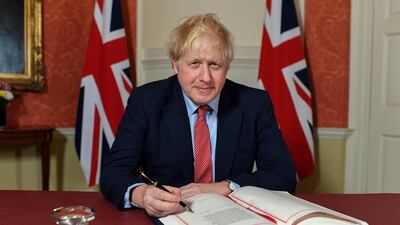Prime Minister Boris Johnson on Friday welcomed "a new chapter" in Britain's history as he signed its divorce treaty with the EU, clearing another hurdle before the country exits the bloc next Friday.
It allows Britain to end its decades-long membership of the European Union and leave its closest neighbours and trading partners after several years of domestic acrimony and delays.
"The signing of the withdrawal agreement is a fantastic moment, which finally delivers the result of the 2016 referendum and brings to an end far too many years of argument and division," Mr Johnson said in a statement.
"This signature heralds a new chapter in our nation's history," he added on Twitter, alongside a photo of the occasion.
“We can now move forward as one country – with a Government focused upon delivering better public services, greater opportunity and unleashing the potential of every corner of our brilliant United Kingdom, while building a strong new relationship with the EU as friends and sovereign equals.”
EU chiefs Ursula von der Leyen and Charles Michel had already put their names to the treaty overnight at a ceremony held behind closed doors in the early hours of the morning.
“Things will inevitably change but our friendship will remain. We start a new chapter as partners and allies,” Mr Michel tweeted in reference to ties with Britain, adding: “I can’t wait to write this new page together.”
The much-disputed Brexit bill became law in the UK on Thursday, which will allow the country to leave the European Union more than 3 years after voters narrowly opted to do so in a referendum in June 2016.
It will now return to Brussels, where the original will be kept in EU archives along with other international treaties, while three copies will be dispatched back to London.
On Wednesday next week, the text will go to the European Parliament for ratification and on Thursday diplomats from the EU member states will approve the deal in writing.
The UK will enter a transition period after January 31, during which time it will abide by EU rules despite no longer being a member. The transition period, due to finish at the end of the year, will allow both sides to negotiate a free trade deal.
The EU named Joao Vale de Almeida to be their ambassador to post-Brexit Britain on Friday. The Portuguese national is due to take up his duties on February 1, the first day of the transition period.
Queen Elizabeth II gave her formal assent to the British withdrawal legislation on Thursday and the EU is now expected to complete the final formalities in the coming days.
Britain will leave the institutions of the union, reducing it to 27 member states, but the withdrawal agreement provides for an 11-month transition period until the end of the year.
During this time, Britain and the rest of the bloc will continue to apply the same rules of business to avoid economic disruption while officials try to negotiate a broader trade deal.
Most experts regard the idea that London and Brussels could agree a comprehensive free trade agreement in that time as ambitious.
But officials have expressed cautious optimism that some kind of agreement can be reached.
Formal trade talks are not expected to begin until the end of February or even March, and in the meantime Michel Barnier has been in intensive talks with EU member states on his negotiating mandate.
After the transition, Britain wants the right to set its own rules in areas such as workers' rights and environmental standards.
But Brussels has warned that the more the UK diverges from EU standards, the less it will have unfettered access to Europe's huge single market.
And a comprehensive free trade agreement of the type the EU has signed with Canada could take years to negotiate.

